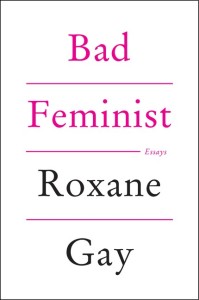 I learned what feminism was as a twenty-year-old journalism major at Ball State University in 1995. Before that, my education in feminism came from coded messages from my mother: “Never rely on a man,” she’d say when she thought I was pining too much for a boyfriend. “It’s a man’s world. Be independent.” Since my mother was a lesbian in those days and we never acknowledged the fact to each other, I figured her cryptic warnings were invariably wrapped up in our different desires for love rather than about the truth of our world.
I learned what feminism was as a twenty-year-old journalism major at Ball State University in 1995. Before that, my education in feminism came from coded messages from my mother: “Never rely on a man,” she’d say when she thought I was pining too much for a boyfriend. “It’s a man’s world. Be independent.” Since my mother was a lesbian in those days and we never acknowledged the fact to each other, I figured her cryptic warnings were invariably wrapped up in our different desires for love rather than about the truth of our world.
Later at Ball State a chunk of my credits needed to come from liberal arts electives. I opted for an introduction to Women’s Studies. It was the first time I learned that women were shockingly devalued in entertainment, the workplace, religion, even in the home. It was the first time I heard the word “feminism.” I took this new knowledge home to my mother and brother. Surely my mother would understand because she was a woman; I was convinced my brother would want to become a feminist because he’d grown up in a house of women. I made my case over Christmas break. In my zeal, I breathlessly blurted out statistics, tried to get them to see how women had been stomped on by patriarchy. Women and men must unite to make sure injustice ends! We should all be feminists, I insisted.
Instead of embracing my new banner, they asked why I was so angry. I tried to convince them I wasn’t angry. I had simply been endowed with knowledge I’d never heard before and wanted them to see (Couldn’t they see?) how disturbing it was. They warned me to not become militant. Militancy is unattractive, they said. No one has stomped on you, they said. Why be angry? I suddenly felt as if I had no right to complain. I dropped my mantle.
Now, twenty years later, I’ve taken it up again. Not because I feel I’ve been wronged and that I haven’t been the recipient of many privileges awarded by the fact that I’m white, educated, heterosexual, and was born in one of the wealthiest nations in human history, or that I haven’t had the opportunity to flourish through the help of both women and men. Instead, I’ve taken it up again because I’m now a college professor who mentors young women at a small Christian liberal arts college. Many of these women carry a two-fold burden: what our traditional society tells them they should be and what their patriarchal religious traditions tell them they should be. Both identities are often in competition and neither allows them to be the people they want to become.
As I began articulating my ideas about my feminism, I read Roxane Gay’s essay collection Bad Feminist (Harper Perennial, 2014) and found that I, too, am a bad feminist. Like Gay who writes, “I sometimes cringe when I am referred to as a feminist, as if I should be ashamed of my feminism or as if the word ‘feminist’ is an insult,” I often hide my feminism because it’s unattractive and that’s the one of the worst things a woman, even a forty-year-old woman, in our culture can be. Gay goes on, “The label is rarely offered in kindness. I am generally called a feminist when I have the nerve to suggest that the misogyny so deeply embedded in our culture is the real problem requiring relentless vigilance.” After all, the caricature of feminism “suggests anger, humorlessness, militancy, unwavering principles.” The caricature also suggests that to be a proper feminist women should, among other ideals, “hate men, hate sex, focus on career.”
Not only does she offer a more complex view of women who identify as feminists, Gay proves herself the consummate cultural critic. No subject seems beyond her purview: entertainment, the workplace, the home, politics, race, education, religion, relationships, sexuality, marriage. Even the fascinating world of Scrabble tournaments. What I found invaluable—what I will take with me—was what I learned about race and what it means for Gay to be a person of color in America.
But before interrogating American culture, Gay first interrogates herself. She writes about her own insecurities and quirks so that by the time she begins pricking my assumptions and pushing me into some uncomfortable corners, I wholly trusted her and wanted her to like me as much as I like her. She writes, “the more I write, the more I put myself out into the world as a bad feminist but, I hope, a good woman—I am being open about who I am and who I was and where I have faltered and who I would like to become.”
And isn’t that all any of us want?
__
Jennifer Ochstein, a Midwestern writer, has published work in Hippocampus Magazine, Evening Street Review, Connotation Press, River Teeth blog, and Lindenwood Review. She’s a staff writer for Newfound Journal and at work on a memoir about her mother.

1 comment
Durango says:
Oct 10, 2016
Yes, everyone wants to tell his/her story, and without the antagonists, where would we be? “[T]he more I write,” the more I realize they made me what I am, good and bad.
Liked your story